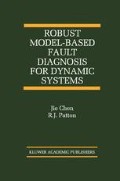Abstract
The generation of robust residuals is the most important task in model-based fault diagnosis techniques. As pointed out in Section 2.11, the disturbance de-coupling based approaches are the dominant approaches for robust residual generation. For those approaches, uncertain factors in system modeling are considered to act via an unknown input (or disturbance) on a linear system model. Although the unknown input vector is unknown, its distribution matrix is assumed known. Based on the information given by the distribution matrix, the unknown input (disturbance) can be de-coupled from the residual. Robust FDI is thus achievable using the disturbance de-coupled residual. This chapter focuses on the robust residual generation problem via unknown input observers. The principle of the unknown input observer (UIO) is to make the state estimation error de-coupled from the unknown inputs (disturbances). In this way, the residual can also be de-coupled from each disturbance, as the residual is defined as a weighted output estimation error. This approach was originally proposed by Watanabe and Himmelblau (1982) who considered the robust sensor fault detection and isolation problem for the system with modeling uncertainty. Later, Wünnenberg & Frank (Wünnenberg and Frank, 1987; Frank and Wünnenberg, 1989; Wünnenberg, 1990) generalized this approach for detecting and isolating both sensor and actuator faults by considering the case when unknown inputs also appear in the output equation. In parallel with this development, a robust scheme for diagnosing actuator faults via UIOs is proposed by Chen and Zhang (1991). A very important contribution of the paper by Chen and Zhang (1991) was to demonstrate the robust FDI approach via to a realistic chemical process system example. Note that Viswanadham and Srichander (1987) and Phatak and Viswanadham (1988) also studied the actuator fault detection and isolation problem via UIOs, however they failed to consider robustness issues. Many other investigators have considered the use of UIOs for robust FDI: e.g. Hou and Müller (1991), Hou and Müller (1994b), Frank and Seliger (1991), Seliger and Frank (1991a), Keller, Nowakowski and Darouach (1992), Chang and Hsu (1993a), Ragot, Maquin and Kratz (1993), Saif and Guan (1993), Wang and Daley (1993), Chen and Patton (1994b), Shields (1994), Yu, Shields and Mahtani (1994b), Yu and Shields (1996) and Hwang, Chang and Hsu (1997).
Access this chapter
Tax calculation will be finalised at checkout
Purchases are for personal use only
Preview
Unable to display preview. Download preview PDF.
Author information
Authors and Affiliations
Rights and permissions
Copyright information
© 1999 Springer Science+Business Media New York
About this chapter
Cite this chapter
Chen, J., Patton, R.J. (1999). Robust Residual Generation Using Unknown Input Observers. In: Robust Model-Based Fault Diagnosis for Dynamic Systems. The International Series on Asian Studies in Computer and Information Science, vol 3. Springer, Boston, MA. https://doi.org/10.1007/978-1-4615-5149-2_3
Download citation
DOI: https://doi.org/10.1007/978-1-4615-5149-2_3
Publisher Name: Springer, Boston, MA
Print ISBN: 978-1-4613-7344-5
Online ISBN: 978-1-4615-5149-2
eBook Packages: Springer Book Archive

